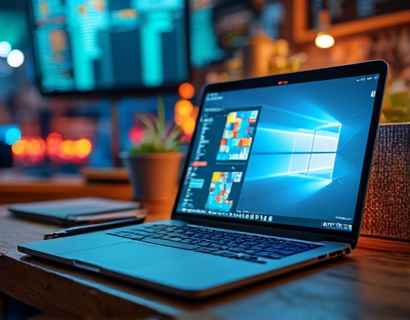Decentralized File Management: Streamlining Business Collaboration with Secure and Efficient Online Solutions
In the rapidly evolving landscape of business collaboration, the need for secure and efficient file management solutions has become paramount. Traditional centralized file management systems often fall short in providing the necessary security, scalability, and ease of use required by modern teams. This has led to a growing interest in decentralized file management platforms that prioritize security and efficiency, redefining the way businesses collaborate and manage their data.
Decentralized file management offers a paradigm shift from the conventional centralized models. By distributing data across a network of nodes rather than storing it in a single location, these platforms enhance data security and availability. This approach not only mitigates the risk of data breaches and loss but also ensures that files are accessible even in the event of network failures or outages.
Enhancing Security Through Decentralization
Security is a top priority for any business, especially when it comes to sensitive information and critical documents. Decentralized file management platforms address this concern by employing advanced cryptographic techniques and distributed consensus mechanisms. Each file is encrypted and fragmented into smaller pieces, which are then stored across multiple nodes in the network. This fragmentation ensures that even if one node is compromised, the entire file remains secure.
Moreover, access control is managed through decentralized identity verification systems, which eliminate the need for centralized authentication servers. This reduces the risk of single points of failure and enhances overall security. Users can grant access to files on a need-to-know basis, ensuring that only authorized personnel can view or edit sensitive information.
Improving Collaboration and Productivity
One of the most significant benefits of decentralized file management is its ability to streamline collaboration among team members. Traditional centralized systems often lead to bottlenecks and inefficiencies, as files need to be shared and re-shared through multiple channels. Decentralized platforms, on the other hand, provide a unified and seamless experience for file sharing and collaboration.
With a decentralized platform, team members can access and edit files in real-time, regardless of their location. This real-time collaboration eliminates the need for version control issues and ensures that everyone is working with the most up-to-date information. The user-friendly interface of these platforms makes it easy for team members to find, share, and manage files, significantly enhancing productivity.
Real-Time File Sharing and Access
Real-time file sharing is a cornerstone of decentralized file management. Unlike centralized systems where files are often locked or require manual sharing, decentralized platforms allow for instant access and collaboration. Team members can upload, download, and edit files simultaneously, with changes reflected immediately across the network. This real-time synchronization ensures that all team members are on the same page, reducing delays and improving project timelines.
Furthermore, decentralized platforms often include features such as file versioning and history tracking. This allows team members to revert to previous versions of a file if necessary, providing a safety net against accidental deletions or overwrites. The ability to track changes and see who made modifications also enhances transparency and accountability within the team.
Scalability and Flexibility
Scalability is another key advantage of decentralized file management solutions. As businesses grow and their data needs evolve, centralized systems can become cumbersome and expensive to scale. Decentralized platforms, however, are designed to handle increasing amounts of data and users without compromising performance. The distributed nature of these systems means that additional nodes can be added as needed, ensuring that the platform can grow alongside the business.
Flexibility is also a significant benefit. Decentralized platforms can integrate with a wide range of existing tools and applications, making it easy for businesses to adopt these solutions without disrupting their current workflows. Whether it's integrating with project management tools, CRM systems, or other enterprise software, decentralized file management platforms offer the flexibility to adapt to various business needs.
Cost Efficiency
Cost efficiency is another critical factor for businesses considering a new file management solution. Centralized systems often require significant upfront investments in infrastructure and ongoing maintenance costs. Decentralized platforms, by contrast, operate on a peer-to-peer model, reducing the need for expensive hardware and centralized servers. This distributed approach not only lowers operational costs but also eliminates the need for costly upgrades and maintenance.
Additionally, many decentralized platforms operate on a subscription-based model, providing predictable and manageable expenses. This pay-as-you-go approach allows businesses to scale their usage based on actual needs, further enhancing cost efficiency. The reduced need for IT support and maintenance also contributes to lower overall costs.
User Experience and Adoption
For a decentralized file management solution to be successful, it must offer an exceptional user experience that encourages adoption and continuous use. A user-friendly interface is essential, as it ensures that team members can easily navigate and utilize the platform's features without extensive training.
The interface of these platforms is designed to be intuitive and straightforward, with clear navigation and well-organized file structures. Drag-and-drop functionality, search capabilities, and customizable dashboards make it easy for users to manage their files and collaborate with team members. The focus on usability helps to overcome the initial resistance that often accompanies the adoption of new technologies.
Training and Support
While the user interface is designed to be self-explanatory, providing comprehensive training and support resources is crucial for smooth adoption. Decentralized platforms should offer detailed documentation, video tutorials, and responsive customer support to assist users in getting started and troubleshooting any issues. This support ensures that team members can quickly become proficient with the platform, maximizing its benefits.
Moreover, community forums and user groups can foster a sense of community and shared knowledge, further enhancing the user experience. By leveraging the collective expertise of users, these platforms can continuously improve and evolve based on real-world feedback and use cases.
Case Studies and Success Stories
To better understand the impact of decentralized file management, let's look at a few success stories from businesses that have adopted these solutions. One notable example is a large multinational corporation that transitioned from a centralized file server to a decentralized platform. The company reported a significant reduction in data breaches and a 30% increase in collaboration efficiency. The real-time access to files and the elimination of version control issues led to faster project turnaround times and higher employee satisfaction.
Another example is a mid-sized software development firm that faced challenges with file sharing and collaboration across remote teams. By implementing a decentralized file management solution, the firm achieved seamless file access and collaboration, resulting in a 40% reduction in project delays. The platform's robust security features also gave the team peace of mind, knowing that sensitive code and client data were well-protected.
Industry Adoption and Trends
The adoption of decentralized file management solutions is on the rise across various industries, driven by the need for enhanced security, scalability, and collaboration. In the healthcare sector, for instance, decentralized platforms are being used to securely share patient records among different providers, ensuring compliance with regulations while improving care coordination. In the financial industry, these platforms are employed for secure document sharing and compliance management, reducing the risk of data breaches and ensuring regulatory adherence.
The technology sector is also embracing decentralized file management, leveraging it for collaborative development and secure data storage. As more businesses recognize the benefits of decentralization, the market for these solutions is expected to grow, with increased innovation and competition leading to better features and more competitive pricing.
Future of Decentralized File Management
The future of decentralized file management looks promising, with ongoing advancements in blockchain technology, distributed storage, and user interface design. As these technologies mature, we can expect even more robust and user-friendly platforms that further enhance the benefits of decentralization.
One area of focus is the integration of artificial intelligence and machine learning to optimize file management and collaboration. AI-driven features such as intelligent search, automated file organization, and predictive analytics can significantly enhance the user experience and operational efficiency. These advancements will make decentralized platforms even more appealing to businesses seeking to stay ahead in a competitive landscape.
Another exciting development is the exploration of interoperability between different decentralized platforms. Standardization efforts are underway to ensure that files and data can seamlessly move between different systems, providing users with greater flexibility and choice. This interoperability will be crucial as the ecosystem of decentralized solutions continues to grow.
Conclusion
Decentralized file management represents a significant leap forward in business collaboration and data management. By prioritizing security, scalability, and user experience, these platforms offer a compelling alternative to traditional centralized systems. As more businesses recognize the advantages of decentralization, the adoption of these solutions is likely to increase, driving innovation and efficiency across industries.
Embracing a decentralized file management approach is not just a technological upgrade; it's a strategic move towards a more secure, collaborative, and efficient future. For businesses and teams looking to optimize their data management processes and enhance productivity, decentralized solutions are the way forward.











































